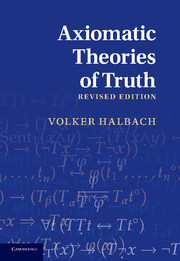Part III - Type-free truth
Published online by Cambridge University Press: 05 February 2015
Summary
Tarski's resolution of the liar paradox by distinguishing an object language from a metalanguage underlies much of modern logic. All the theories in the previous part rely on this approach, although both languages are very similar.
In Tarski's terminology a language is more like what one would call a deductive system or a theory in modern terminology. The axioms and rules of the object language do not matter for Tarski's purpose; what are crucial are the axioms and rules of the metalanguage.
For instance, in typed theories like TB or CT the object language is the language L of arithmetic with PA as the associated system and the metalanguage is the same language expanded merely by an additional predicate symbol T for truth. In each case the object theory is a subtheory of the metatheory and the metatheory is formulated in a language – here LT – properly extending the object language. In the hierarchical theories the theory RTγ is a metalanguage for RT<γ.
Despite the success of Tarski's resolution of the paradoxes in this way, many philosophers have been discontent with a Tarskian approach and so have developed alternative proposals, trying to minimize or close the gap between object and metalanguage.
- Type
- Chapter
- Information
- Axiomatic Theories of Truth , pp. 121 - 125Publisher: Cambridge University PressPrint publication year: 2014



